🇦🇺 Australia
🇨🇦 Canada
🇨🇿 Czechia
🇩🇰 Denmark🇪🇪 Estonia
🇮🇪 Ireland
🇮🇱 Israel
🇮🇹 Italy
🇯🇵 Japan
🇲🇽 Mexico
🇵🇱 Poland
🇰🇷 South Korea
🇨🇭 Switzerland
🇬🇧 United Kingdom
🇺🇸 United States of Americaand more
🇦🇺 Australia
🇨🇦 Canada
🇨🇿 Czechia
🇩🇰 Denmark🇪🇪 Estonia
🇮🇪 Ireland
🇮🇱 Israel
🇮🇹 Italy
🇯🇵 Japan
🇲🇽 Mexico
🇵🇱 Poland
🇰🇷 South Korea
🇨🇭 Switzerland
🇬🇧 United Kingdom
🇺🇸 United States of Americaand more
$17.85
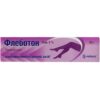
Fleboton hard capsules 300 mg 5 blisters of 10 pcs.
$24.90
Fleboton is capillary and venotonic agent. Has anti-inflammatory and antioxidant effects, inhibits hyaluronidase. Prevents the oxidation of hyaluronic, ascorbic acid and adrenaline, inhibits lipid peroxidation. Troxerutin reduces the permeability and fragility of capillaries and prevents damage to the basement membrane of endothelial cells and, in addition, has membrane-stabilizing, antihemorrhagic, detoxifying, antiallergic, venotonic properties.
-
— or —
Composition and form of release
Composition
active ingredient: troxerutin;
1 capsule contains troxerutin 300 mg;
excipients: lactose monohydrate, colloidal anhydrous silica, macrogol, magnesium stearate, hard gelatin capsule (gelatin, quinoline yellow (E 104), sunset yellow FCF (E 110), titanium dioxide (E 171)).
Release form
The capsules are hard.
Pharmacological properties
Pharmacodynamics. Fleboton – capillary and venotonic agent. Has anti-inflammatory and antioxidant effects, inhibits hyaluronidase. Prevents the oxidation of hyaluronic, ascorbic acid and adrenaline, inhibits lipid peroxidation. Troxerutin reduces the permeability and fragility of capillaries, prevents damage to the basement membrane of endothelial cells by various factors and, in addition, has membrane-stabilizing, antihemorrhagic, detoxifying, antiallergic, venotonic properties. Reduces edema, improves trophism and reduces the severity of other symptoms associated with venous insufficiency or impaired outflow of lymphatic fluid.
Pharmacokinetics. C max is established 2-8 hours after oral administration. The decrease in plasma concentration is bioexponential. Initially, the plasma concentration decreases progressively within 40 hours, after which it decreases very slowly. It binds to blood plasma proteins within 27-29%. It is metabolized by glucuronidation. Within 24 hours, the main part (up to 70%) is excreted in the bile, and a small part (25%) is excreted in the urine.
Indication
For symptomatic treatment:
- swelling and pain in varicose veins, varicose dermatitis;
- chronic venous insufficiency;
- varicose ulcers;
- hemorrhoidal disease;
- diabetic retinopathy (as part of complex therapy).
Contraindication
Hypersensitivity to the active substance or any of the excipients.
Gastric and duodenal ulcer, chronic gastritis (in the exacerbation phase).
Application
Take the capsules with a meal, with a glass of water.
The usual dose is 2 capsules per day. Maintenance therapy – 1 capsule per day for 3-4 weeks. This treatment can be combined with the simultaneous use of the gel. The effectiveness of treatment depends on the regularity of administration, the correct dosage and duration of therapy. Clinical experience shows that sometimes the desired effect is observed when doses exceeding 600 mg (2 capsules) per day are used. The dosage and duration of the drug are determined by the doctor, taking into account the nature, severity and course of the disease.
Children: There are no data on the use of the drug in children.
Special instructions
Patients with edema of the lower extremities as a result of heart, kidney, or liver disease should not use the drug because it is ineffective in these conditions.
The drug should be prescribed with caution to patients with severe liver and gallbladder diseases. Since the drug irritates the gastric mucosa, it should be taken with food.
The drug contains lactose, therefore patients with galactose intolerance, Lapp lactase deficiency or glucose-galactose malabsorption should not use the drug.
Dye E110 may cause allergic reactions.
The risk of developing allergies is higher in patients with hypersensitivity to acetylsalicylic acid.
Use during pregnancy or breastfeeding
According to general clinical practice, use is not recommended in the first trimester of pregnancy. In the second and third trimesters, as well as during breastfeeding, it is recommended to use the drug as prescribed by a doctor, when the expected benefit from its use for the mother outweighs the possible risk to the fetus.
Ability to influence reaction speed when driving vehicles or other mechanisms
Fleboton does not affect the reaction speed when driving or working with other mechanisms.
Overdose
Symptoms: manifestations of adverse reactions may increase.
Treatment. Stop taking the drug. It is recommended to induce vomiting or perform gastric lavage and carry out symptomatic treatment. If necessary, peritoneal dialysis can be prescribed.
Side effects
The following undesirable side effects are classified by organ system and frequency of occurrence: very common (≥1/10), common (≥1/100, 1/10), uncommon (≥1/1000, 1/100), rare (≥1/10,000 and 1/1000), very rare (1/10,000), frequency unknown (cannot be estimated from the available data).
Adverse reactions are rarely observed during treatment. In some cases, the following may occur:
- On the part of the immune system: very rarely – anaphylactic shock, anaphylactoid reactions, hypersensitivity reactions.
- From the nervous system: very rarely – dizziness, headache, sleep disturbances.
- Vascular disorders: very rarely – ecchymoses (large bruises).
- From the digestive system: rarely – abdominal pain, discomfort, dyspepsia, flatulence, diarrhea, gastrointestinal dysfunction.
- Skin and subcutaneous tissue disorders: rarely – rash, itching, urticaria.
- General disorders and administration site conditions: very rarely – increased fatigue.
Interactions
The drug enhances the effect of ascorbic acid on strengthening the structure and reducing the permeability of the vascular wall.
Storage conditions
In the original packaging to protect from moisture, at a temperature not exceeding 25 °C.
You may also like


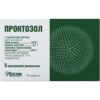
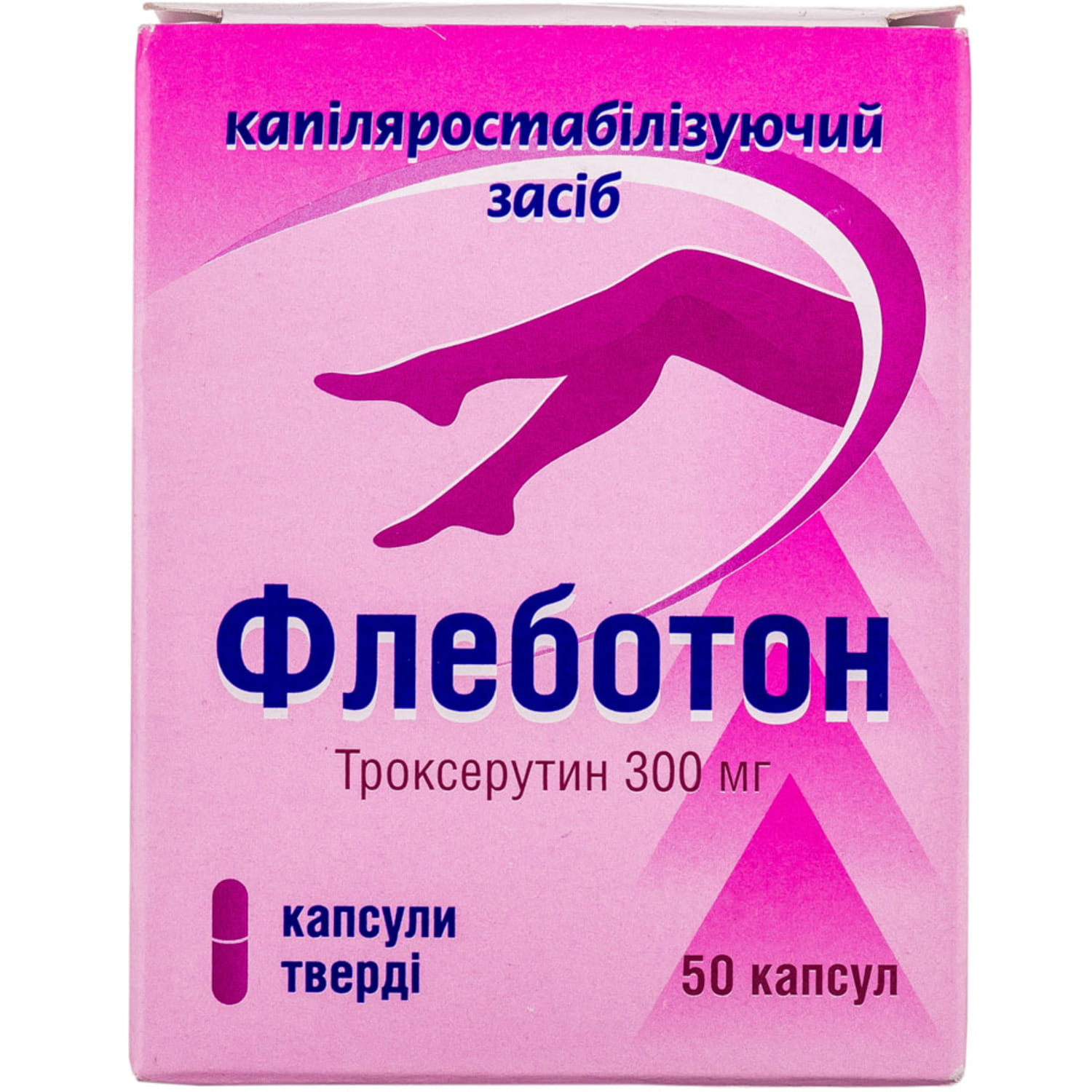
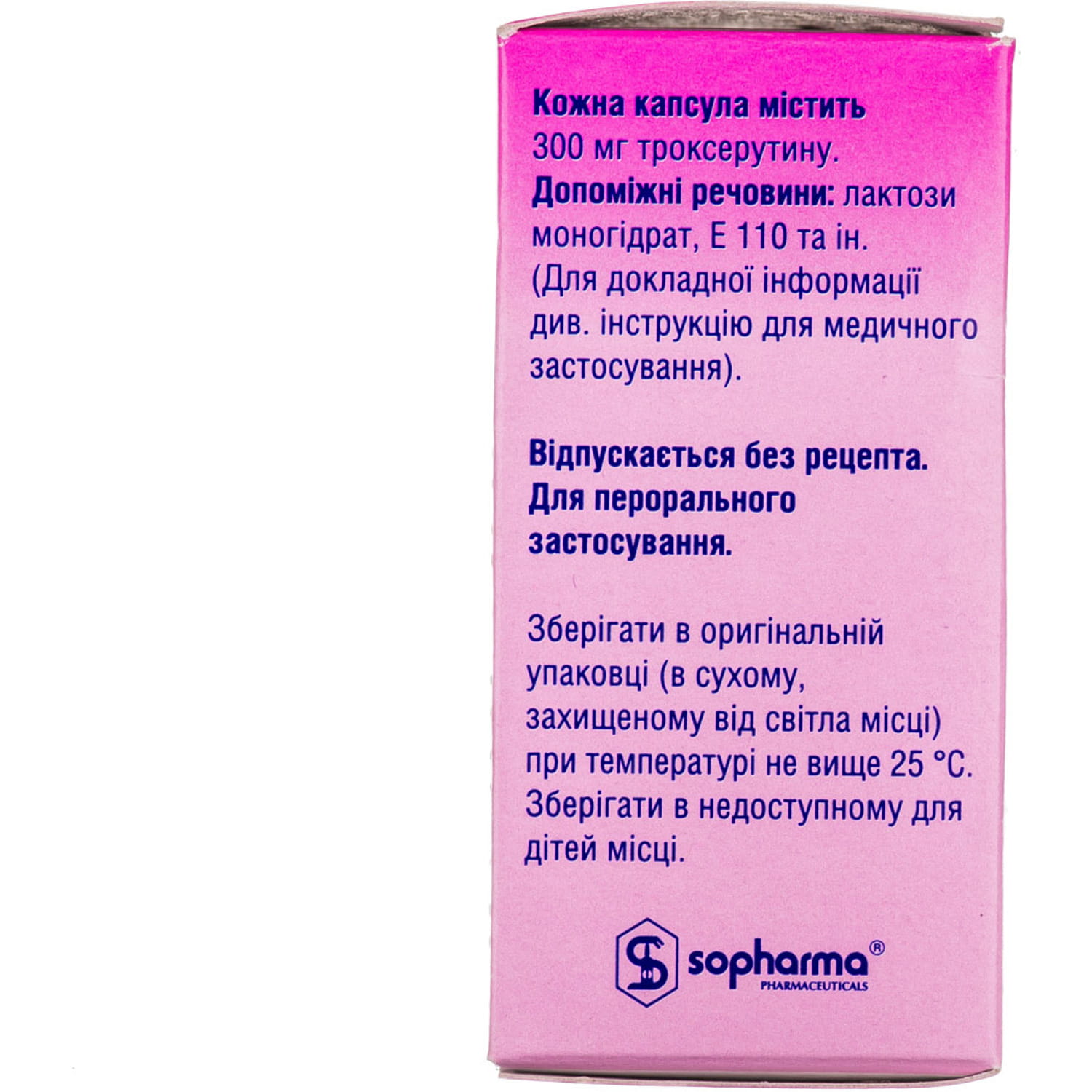
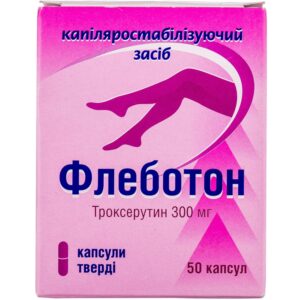
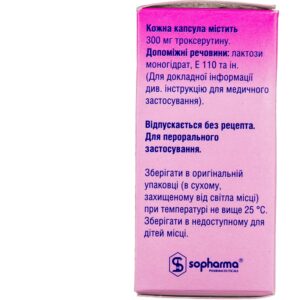


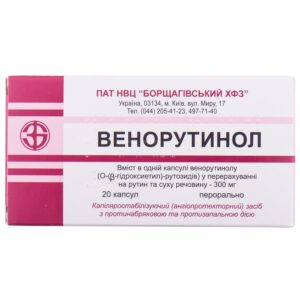
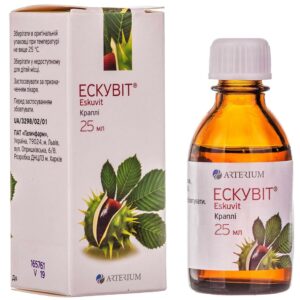
Reviews
There are no reviews yet.